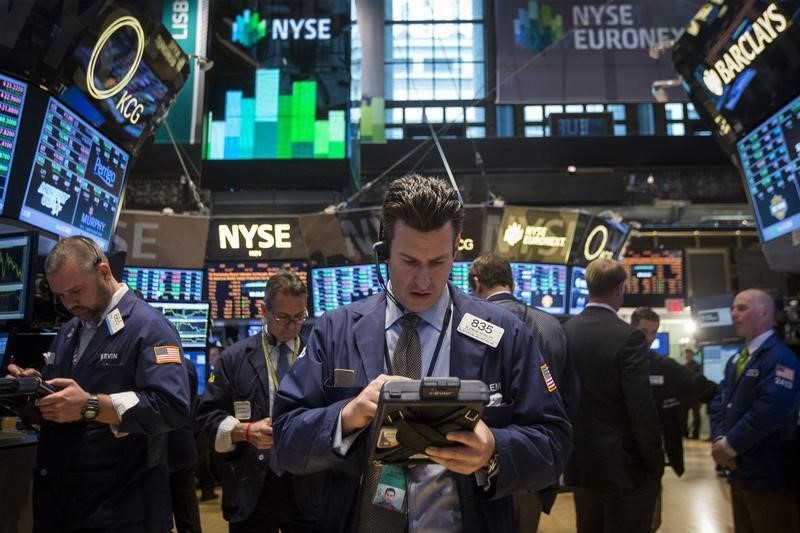TPI Composites files for Chapter 11 bankruptcy, plans delisting from Nasdaq
Investing.com - U.S. stock futures slipped lower Monday after President Trump announced further tariffs over the weekend, this time against major trading partners, the European Union and Mexico. Bitcoin soared to new record highs at the start of "Crypto Week", while crude edged higher and China reported a growing trade surplus.
1. Trump targets Mexico, EU with tariffs
Global trade is in the spotlight once more after U.S. President Donald Trump announced over the weekend he would be introducing 30% tariffs on imports from Mexico and the European Union.
This followed news over the past week of similar tariffs on Japan, South Korea, Canada, and Brazil, as well as a 50% duty on all copper imports.
Trump’s tariffs will be effective from August 1, giving the targeted countries less than three weeks to reach a trade deal with Washington, after having postponed a deadline from July 9.
Recent data showed U.S. customs duty collections surged to a record-high $113.3 billion gross in the first nine months of fiscal 2025 (the government’s fiscal year ends on September 30).
2. U.S. futures fall on renewed trade worries
U.S. stock futures fell Monday on increased fears of a global trade war after Trump’s latest trade announcement, with quarterly corporate earnings also in focus.
At 02:55 ET (06:55 GMT), the S&P 500 futures traded 35 points, or 0.6%, lower Nasdaq 100 futures dropped 120 points, or 0.5%, and Dow futures fell 250 points, or 0.6%.
The main Wall Street indices retreated last week, falling back from record levels, with the S&P 500, the Nasdaq Composite and the Dow Jones Industrial Average all snapping three-week winning streaks.
Sentiment has been further jolted by Trump announcing over the weekend plans to introduce 30% tariffs on imports from Mexico and the European Union, raising the risk of a global trade war.
Investors will also be focusing on the new quarterly earnings season, which is set to ramp up this week, starting in earnest on Tuesday with numbers from a number of senior banks, including JPMorgan Chase (NYSE:JPM), Wells Fargo (NYSE:WFC) and Citigroup (NYSE:C).
3. China’s trade surplus grew in June
China’s trade surplus grew more than expected in June, helped by a healthy growth in exports after the trade agreement between Beijing and Washington saw the two countries lower their respective trade tariffs.
The trade surplus expanded to $114.77 billion last month, customs data showed on Monday, more than the expected $113.20 billion, and also above the $103.22 billion seen in May.
China’s exports grew 5.8% year-on-year in dollar terms in June, more than the 5% expected and also above the 4.8% rise seen in the prior month.
Customs data showed China’s rare earth exports picked up in June from the prior month, as progress in trade talks with the U.S. saw China issue more export licenses to local producers. Washington had earlier this month relaxed some chip technology export restrictions against Beijing.
But domestic demand in China still appeared relatively weak, with imports rising just 1.1% y-o-y in June, below expectations for 1.3% growth, but still an improvement from the 3.4% decline in the prior month.
Monday’s data sets the country up for a positive gross domestic product reading for the second quarter on Tuesday, with the print expected to show growth surpassing Beijing’s 5% annual target.
4. Bitcoin surges at start of “Crypto Week”
Bitcoin, the world’s largest cryptocurrency, climbed to another record high on Monday, crossing the $120,000 level for the first time as investors bet on long-sought policy wins for the industry this week.
At 02:55 ET, Bitcoin rose 3.7% to $122,020, having climbed as high as $122,530 earlier in the session.
Bitcoin has been on a tear over the past week, fueled by strong ETF inflows and increasing hopes for more crypto-friendly regulation in the United States.
Investor sentiment has been propelled by expectations that the U.S. House of Representatives will debate several landmark crypto bills this week, including the Genius Act, Clarity Act, and the Anti‑CBDC Surveillance State Act.
If passed during what has been dubbed "Crypto Week”, these measures could establish comprehensive regulatory frameworks governing stablecoins, crypto asset custody, and the broader digital financial ecosystem.
These bills have the approval of Trump, who has called himself the "crypto president" and has urged policymakers to revamp rules in favor of the industry.
The surge in bitcoin, which is up 30% for the year so far, has resulted in the sector’s total market value swelling to about $3.78 trillion, according to data from CoinMarketCap.
5. Crude gains ahead of Trump’s “major statement”
Oil prices edged higher Monday as traders await news of potential additional U.S. sanctions on Russia that may affect global output.
At 02:55 ET, Brent futures climbed 0.1% to $70.40 a barrel, and U.S. West Texas Intermediate crude futures rose 0.1% to $68.54 a barrel.
Trump is due to make a "major statement" on Russia on Monday, having expressed frustration with Russian President Vladimir Putin due to the lack of progress in ending the war in Ukraine.
A bipartisan U.S. bill that would hit Russia with sanctions gained momentum last week in Congress, but it still awaits support from Trump.
European Union envoys are also seen to be close to agreeing another package of sanctions against Russia that would include a lower price cap on the country’s oil exports.
(Reuters contributed reporting.)
